- Homepage
- Our natural honey
- When Can I Harvest Honey
When can I harvest honey?
When can I harvest honey reminds us of the responsibility we have to our pets; they are not to be exploited but rather a relationship in which we are both winners.
It is unfortunate that for as long as I can remember, we go and "rob the bees;" it does smack of underhand exploitation.
Harvesting the honey is an important part of management of the hive. During a heavy flow the workers will fill every single cell they can find with nectar and pollen; soon there is nowhere for the queen to lay her eggs.
One of two things happens. Either the whole swarm absconds or they breed a young virgin; and then the old queen leaves with much of the workforce. There is still little room for the new monarch to lay her eggs.
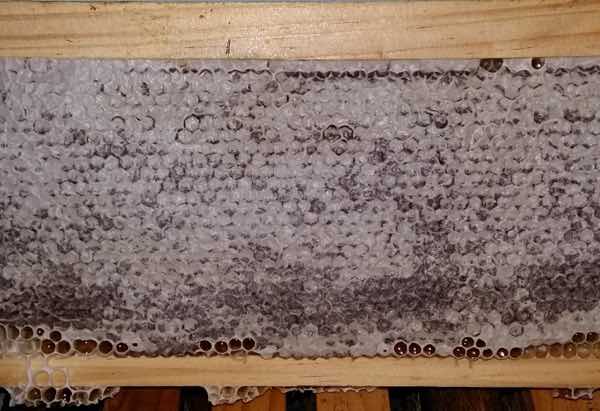 Fully capped honeycomb ready for harvesting.
Fully capped honeycomb ready for harvesting.The beekeeper's responsibility
The beekeeper's first responsibility is to go into the brood nest, remove the outer frames which may be filled to the brim with honey and place two new sheets of foundation in the centre of the hive.
Young bees will quickly draw out the wax, creating space for her majesty to lay her eggs and ensure the future of the hive.
The second responsibility is to harvest most of the honey if there is still a strong flow on the go; or only some of it if the flowers are beginning to fade.
Thirdly he or she will scrape out all the old pollen which they never use but it clogs the frames, rendering the comb useless to the bees. They don't seem to do this themselves.
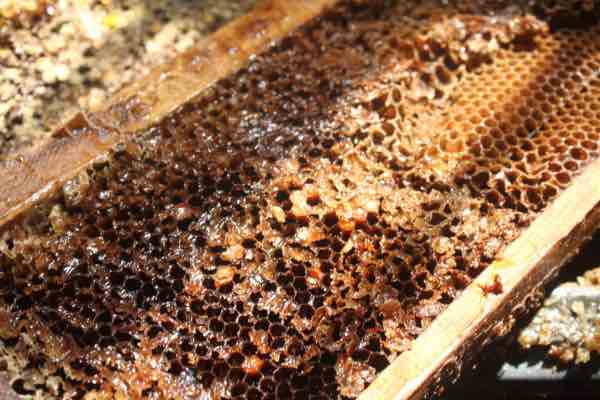
The beekeeper uses a tool to scrape down the comb to the foundation to remove the old pollen; the bees are unwilling to use it. It becomes mouldy and a source of disease.
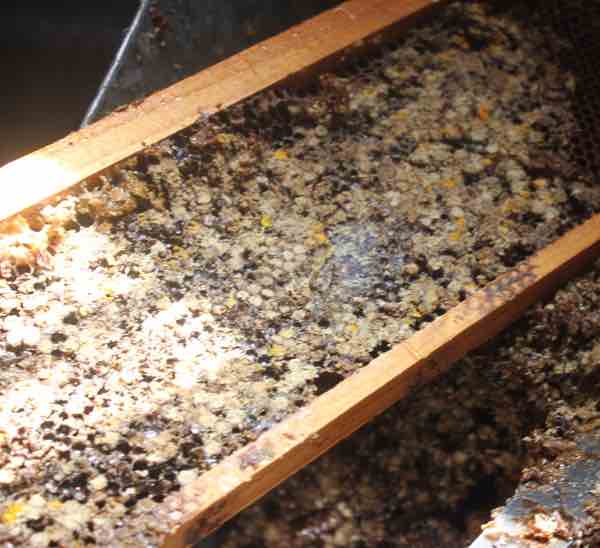
When can I harvest honey?
When can I harvest honey is an important question for a beginner. After one or two years of keeping bees you will soon learn that the flow usually starts in a certain month; and lasts for so many weeks. If you are sharp you may notice the darling buds bursting out.
There are two tests used to decide whether you can harvest the honey.
- Holding the frame of honey face down, give it a good shake. Do drops of nectar splash out? Then it's not ripe and you have to wait a week or so.
- Is the frame two-thirds capped? Then you can take it.
Early in the flow you can take all the honey. In fact if you don't they may well swarm and find a new home in your neighbour's chimney. Nearer the end you must leave some for them for the lean months that lie ahead.
Preparation for the honey flow
It takes about three weeks for the colony to get into full swing after the nectar flow begins; by which time it may be nearly over.
It's a good idea to stimulate the hive using equal parts of white sugar and hot water, beginning about a month before the anticipated start to the honey flow. This tells the queen to start laying in earnest.
In fact it is often at this time that they are very hungry and perhaps starving; feeding them is part of the beekeeper's responsibility.
They will then have a head start; and will refuse the sugar solution, favouring the nectar from flowers when the flow begins. Stop the feeding immediately.
There are many ways of feeding the bees. Each apiarist has his favourite method. After many years of trying them all I now just remove two frames from the top super and place a cut-open plastic milk bottle in the space. Fill it with twigs and leaves so they don't drown.
It works well and there is no robbing which can be a problem in a dearth if you feed at the entrance.
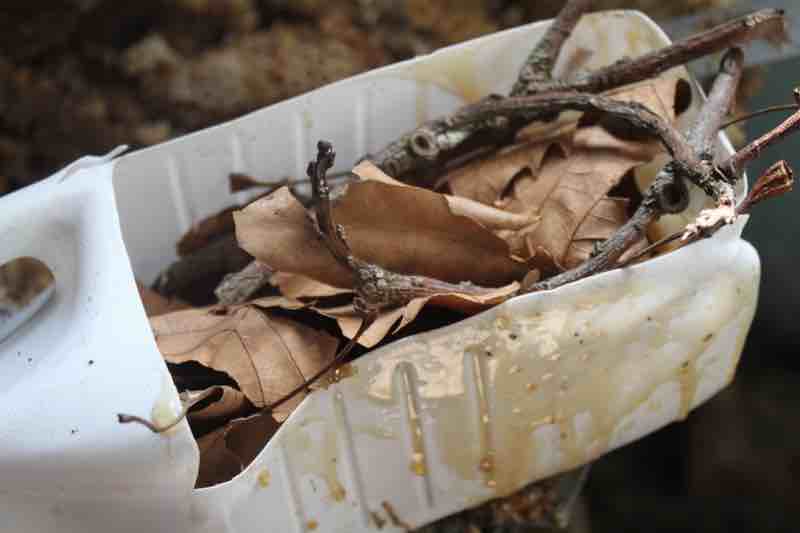
When can I harvest honey? This afternoon I had a wake-up call; never go near a beehive without a smoker and full protective clothing. Occasionally, probably because of some change in the weather they go absolutely crazy. I would have taken thousands of stings had I not been properly prepared. They drove the thief from the apiary.
Tomorrow they will probably be quiet as mice; being unpredictable is what makes bees so dangerous.
So why do we keep bees?
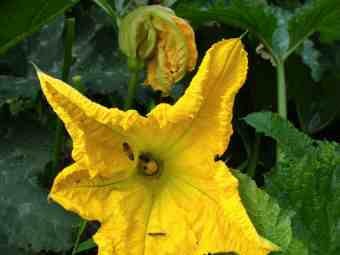 Butternut flower with an attendant honeybee
Butternut flower with an attendant honeybeeIf they are so dangerous then why do we keep bees? There are many reasons but I will highlight just two. We are Cyan Zone people concerned with blue and green issues.
Blue Zone issues are to do with wellness; natural honey can only be obtained from a small beekeeper. In contrast to that from commercial bottlers, it lowers blood glucose and is extremely good for us; in limited quantities.
Green Zone issues are to do with preserving the planet for our grandchildren. Colony collapse disease is killing our bees. Pollination of plants and preservation of species is utterly dependent on them.
We keep bees, caring for both our own wellbeing and that of Planet Earth. Having an apiary in the garden means we have no need for sugar with all its attendant problems; and every vegetable and fruit flower is pollinated. On a small suburban plot we can and do grow a mountain of food.
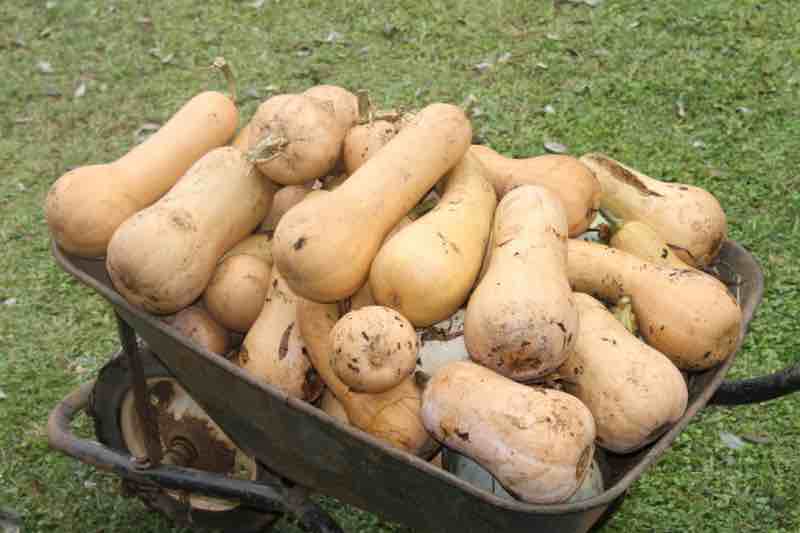 Keeping bees means a mountain of food
Keeping bees means a mountain of foodGive and take
So the apiarist provides a safe, dry home for his bees. He manages the combs to keep their queen happy, removing those that are old and providing fresh foundation wax.
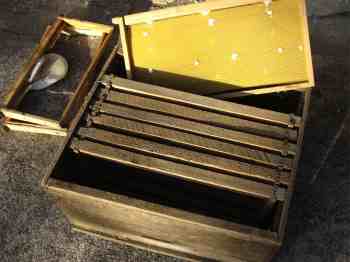 Hives need clean, new foundation wax every year.
Hives need clean, new foundation wax every year.In exchange the bees provide the nectar of the gods for their keeper. It's a mutually beneficial but not entirely harmonious relationship. We say we harvest the honey; they think we are robbers out to steal from their pantry. There is some truth in it.
It does enable the beekeeper's family to reduce their sugar-intake almost to zero. With natural honey available they can escape from the crippling diabetes that is sweeping through the world; the inflammation associated with refined carbs is the chief cause of the chronic degenerative diseases[2].
It's a spiritual issue in reality; treating our bodies as sacred.
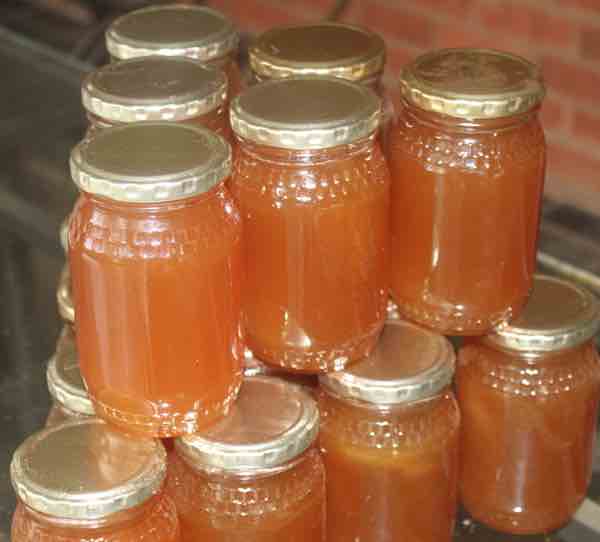 16 bottles of natural honey after just two months
16 bottles of natural honey after just two monthsThe material expressed on this page is gleaned from the nutritional and environmental literature; it is clearly referenced. A plain distinction is made between the author's opinion and that which is scientifically proven. When in doubt consult your health professional.
To suggest a correction or clarification, write to Dr Bernard Preston here. Contact.
When browsing use right click and "Open Link in New Tab" or you may get a bad gateway signal.
Newsletter
Our newsletter is entitled "create a cyan zone" at your home, preserving both yourself and Mother Earth for future generations; and the family too, of course. We promise not to spam you with daily emails promoting various products. You may get an occasional nudge to buy one of my books.
Here are the back issues.
- Lifestyle and ideal body weight
- What are ultra-processed foods?
- Investing in long-term health
- Diseases from plastic exposure
- Intensive lifestyle management for obesity has limited value
- A world largely devoid of Parkinson's Disease
- The impact of friendly bacteria in the tum on the prevention of cancer
- There's a hole in the bucket
- Everyone is talking about weight loss drugs
- Pull the sweet tooth
- If you suffer from heartburn plant a susu
- Refined maize meal and stunting
- Should agriculture and industry get priority for water and electricity?
- Nature is calling
- Mill your own flour
- Bake your own sourdough bread
- Microplastics from our water
- Alternative types of water storage
- Wear your clothes out
- Comfort foods
- Create a bee-friendly environment
- Go to bed slightly hungry
- Keep bees
- Blue zone folk are religious
- Reduce plastic waste
- Family is important
- What can go in compost?
- Grow broad beans for longevity
- Harvest and store sunshine
- Blue zone exercise
- Harvest and store your rainwater
- Create a cyan zone at your home
Did you find this page interesting? How about forwarding it to a friendly book or food junkie? Better still, a social media tick would help.
- Homepage
- Our natural honey
- When Can I Harvest Honey
Address:
56 Groenekloof Rd,
Hilton, KZN
South Africa
Website:
https://www.bernard-preston.com